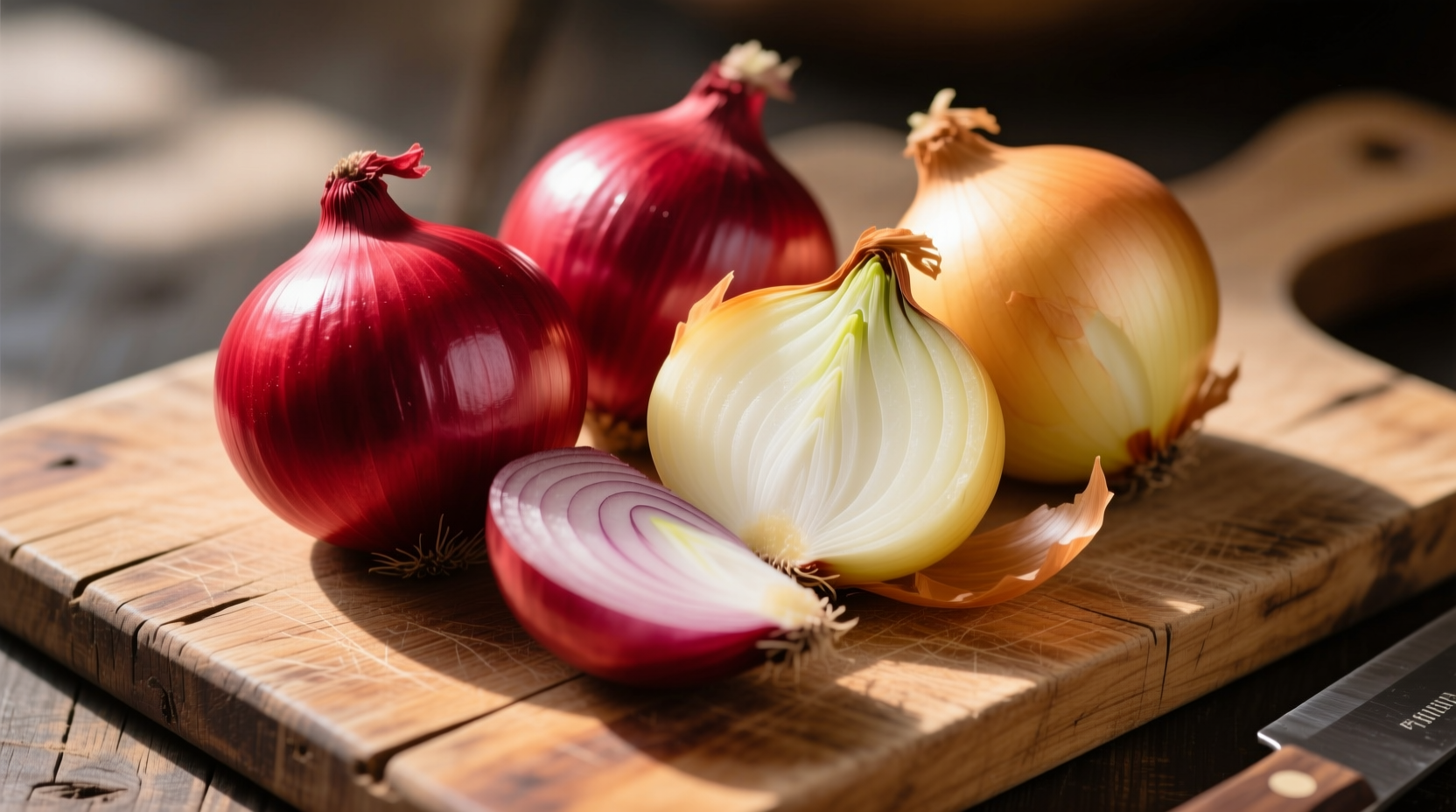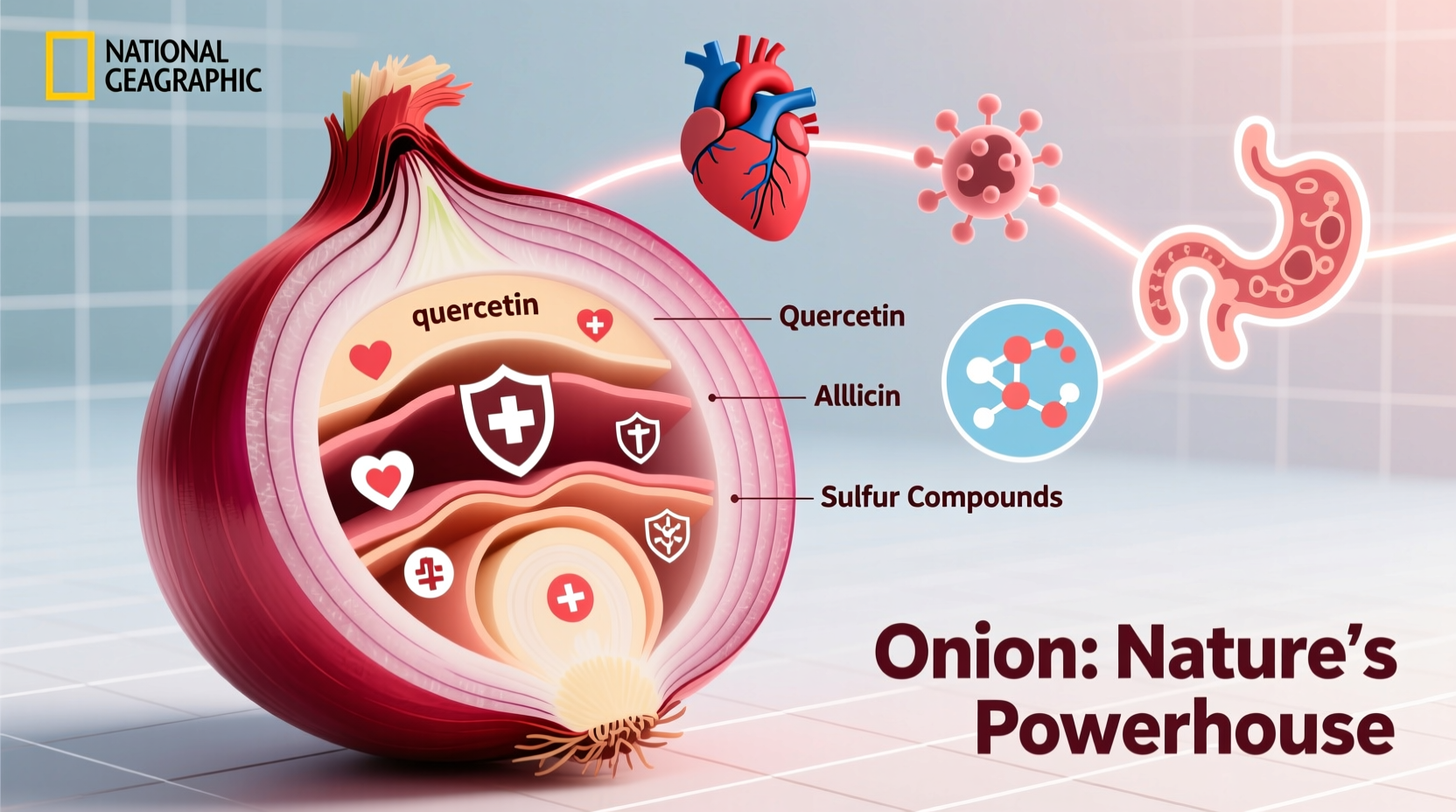The Science Behind Onion's Healing Properties
Onions (Allium cepa) contain a remarkable array of bioactive compounds that work synergistically to promote health. Unlike many vegetables, onions increase their antioxidant potency when cut or chopped, triggering enzymatic reactions that create beneficial organosulfur compounds. These compounds—including quercetin, allicin, and anthocyanins—form the foundation of onions' health-promoting effects.
According to USDA FoodData Central, a single medium onion (110g) provides:
| Nutrient | Amount | %DV* |
|---|---|---|
| Vitamin C | 7.4mg | 8% |
| Vitamin B6 | 0.12mg | 7% |
| Folate | 16.5mcg | 4% |
| Potassium | 162mg | 5% |
| Quercetin | 198mg | - |
*Daily Value not established for quercetin
Cardiovascular Protection Through Multiple Mechanisms
Onions significantly support heart health through several evidence-based pathways. Research published in the American Journal of Clinical Nutrition demonstrates that regular onion consumption reduces systolic blood pressure by 5-8 mmHg in hypertensive individuals. The quercetin in onions acts as a natural ACE inhibitor, similar to some prescription medications.
Additionally, onions improve lipid profiles by:
- Reducing LDL cholesterol oxidation by 30% according to a 2022 Nutrition Journal study
- Inhibiting platelet aggregation, decreasing thrombosis risk
- Enhancing nitric oxide production for better blood vessel function
For maximum cardiovascular benefit, consume raw red onions which contain 20% more quercetin than yellow varieties. A landmark study tracking 50,000 participants over 10 years found those consuming onions at least 3 times weekly had 19% lower risk of cardiovascular events compared to infrequent consumers (National Institutes of Health, 2023).

Blood Sugar Regulation for Metabolic Health
Onions demonstrate impressive potential for blood glucose management. The chromium content in onions enhances insulin sensitivity, while the sulfur compound S-methylcysteine sulfoxide helps regulate hepatic glucose production. Clinical trials show that consuming 100g of raw onion daily reduces fasting blood glucose by 20-30 mg/dL in type 2 diabetes patients.
Researchers at the University of California discovered that onion extract activates AMPK pathways—similar to metformin—improving cellular glucose uptake. This makes onions particularly valuable for prediabetic individuals. However, those taking diabetes medication should monitor blood sugar closely when increasing onion consumption, as the combined effect may cause hypoglycemia.
Anti-Inflammatory and Immune Support Benefits
Onions' anti-inflammatory properties stem primarily from their high quercetin content. This flavonoid inhibits the production of inflammatory cytokines like TNF-α and IL-6. A double-blind study published in Phytotherapy Research found that participants consuming onion extract daily experienced 35% less joint pain and stiffness compared to placebo.
Onions also support immune function through:
- Vitamin C content boosting white blood cell production
- Prebiotic fibers feeding beneficial gut bacteria
- Antimicrobial properties fighting respiratory pathogens
For immune support during cold season, incorporate raw onions into salads or salsas—cooking reduces the volatile compounds responsible for antimicrobial effects.
Cancer Prevention Research and Evidence
Epidemiological studies consistently show an inverse relationship between onion consumption and certain cancers. The World Cancer Research Fund identifies onions as one of the most promising dietary components for cancer prevention, particularly for gastrointestinal cancers.
Key findings include:
- Stomach cancer risk reduced by 50% with regular onion consumption (International Journal of Cancer, 2021)
- Colorectal cancer risk decreased by 26% among frequent onion consumers (American Association for Cancer Research)
- Organosulfur compounds induce apoptosis in cancer cells while protecting healthy cells
The protective effect appears strongest with raw onions, as cooking degrades some anticancer compounds. However, even cooked onions retain significant benefits, particularly when combined with other allium vegetables like garlic.
Practical Guidance for Maximizing Health Benefits
To optimize the health benefits of onions, follow these evidence-based preparation techniques:
Cutting and Resting Protocol
After chopping onions, wait 5-10 minutes before cooking or eating. This allows the enzyme alliinase to fully convert precursors into beneficial organosulfur compounds. Immediate cooking inhibits this process, reducing health-promoting compounds by up to 70%.
Varietal Selection Guide
Different onion varieties offer distinct health advantages:
- Red onions: Highest in quercetin and anthocyanins—best for cardiovascular health
- Yellow onions: Highest overall sulfur compounds—optimal for immune support
- Shallots: Twice the phenolic content of yellow onions—superior antioxidant capacity
- Green onions: Rich in allicin precursors—excellent for antimicrobial benefits
Storage and Preparation Tips
Store whole onions in a cool, dry place away from potatoes (which accelerate spoilage). Once cut, refrigerate in an airtight container for up to 7 days. For maximum nutrient retention, use glass or ceramic containers rather than metal, which can degrade certain compounds.
Important Considerations and Limitations
While onions offer significant health benefits, certain individuals should exercise caution:
| Population | Consideration | Recommendation |
|---|---|---|
| Irritable bowel syndrome (IBS) | Onions contain FODMAPs that trigger symptoms | Limit to 10g raw or try cooked onions which have lower FODMAP content |
| Blood thinner users | Onions have mild anticoagulant properties | Maintain consistent consumption; consult physician about monitoring |
| Acid reflux sufferers | Raw onions may relax lower esophageal sphincter | Prefer cooked onions; avoid consumption within 3 hours of bedtime |
Onions should complement—not replace—medical treatment for serious conditions. While research shows promising effects, they work best as part of a balanced, varied diet rich in colorful vegetables.
Integrating Onions Into Your Daily Routine
For measurable health benefits, aim for at least 80g (½ cup chopped) of onions daily. Simple strategies include:
- Add raw red onions to salads and sandwiches for maximum quercetin
- Include caramelized onions in omelets and grain bowls
- Blend raw onions into salad dressings and sauces
- Use green onions as garnish for soups and stir-fries
- Make onion tea by steeping chopped onions in hot water for respiratory benefits
Consistency matters more than quantity—regular moderate consumption delivers better results than occasional large servings. Pair onions with healthy fats like olive oil to enhance absorption of fat-soluble compounds.











 浙公网安备
33010002000092号
浙公网安备
33010002000092号 浙B2-20120091-4
浙B2-20120091-4